Zuma: Levels
I’d like to expand on something I said earlier: that the level layout affects how Zuma plays. I already pointed out how the geometry of the path makes some parts more difficult to aim at than others, but that’s a relatively small matter — I do occasionally fail to put a ball where I want it, but, as I’ve said before, aiming is not the game’s primary difficulty.
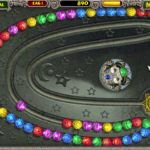 More relevant is how the path allows or blocks shots. For example, consider the level called “Long Range”: the path is open on the right side, allowing the player to easily dispose of any balls that aren’t immediately useful.
More relevant is how the path allows or blocks shots. For example, consider the level called “Long Range”: the path is open on the right side, allowing the player to easily dispose of any balls that aren’t immediately useful. 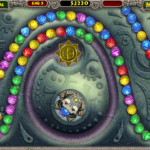 Other boards, such as “Rorschach”, make this convenience contingent on how you play: the path ultimately closes around you, but it’s possible to keep the balls from advancing that far, or to maintain a gap if they do.
Other boards, such as “Rorschach”, make this convenience contingent on how you play: the path ultimately closes around you, but it’s possible to keep the balls from advancing that far, or to maintain a gap if they do.
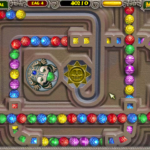 Also significant is the ability of the path to cross itself. We see this used to great effect in “Shrine of Quetzalcoatl”, where the part that the player can reach is quickly divided into three non-adjacent pieces. In the levels that simply spiral or zigzag without crossing, you pretty much always have access to the same balls, which is to say, the ones that have been there longest. The player comes to remember which colors are needed where, and this knowledge helps the player to act with appropriate quickness. But when the path weaves in and out like this, the run of two yellows that you remember seeing a moment ago may not be available at the moment.
Also significant is the ability of the path to cross itself. We see this used to great effect in “Shrine of Quetzalcoatl”, where the part that the player can reach is quickly divided into three non-adjacent pieces. In the levels that simply spiral or zigzag without crossing, you pretty much always have access to the same balls, which is to say, the ones that have been there longest. The player comes to remember which colors are needed where, and this knowledge helps the player to act with appropriate quickness. But when the path weaves in and out like this, the run of two yellows that you remember seeing a moment ago may not be available at the moment.
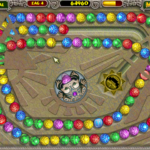 It should also be noted that these crossings rely on the path going through tunnels. Balls in these tunnels are inaccessible even when there’s nothing blocking the way. “Sunstone” is notable for putting a tunnel near the very end of the track, exactly where it prevents you from doing anything effective at the game’s most desperate moments, when your marbles are about to disappear into the sunskull’s maw.
It should also be noted that these crossings rely on the path going through tunnels. Balls in these tunnels are inaccessible even when there’s nothing blocking the way. “Sunstone” is notable for putting a tunnel near the very end of the track, exactly where it prevents you from doing anything effective at the game’s most desperate moments, when your marbles are about to disappear into the sunskull’s maw.
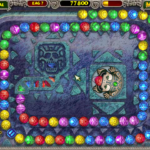 But the level designers don’t really need tunnels to do that. I just encountered for the first time the board “Zumaic Exodus”, possibly the last new level in the game. Its concept is so simple, I should have been anticipating it: it starts in the middle and spirals outward. Thus, it makes you deal with the newest additions to the board, while the oldest disappear out of reach. There’s a sense of helplessness there, as runs of color that you hoped to smash slip away, even though the player’s power to affect things really hasn’t changed all that much.
But the level designers don’t really need tunnels to do that. I just encountered for the first time the board “Zumaic Exodus”, possibly the last new level in the game. Its concept is so simple, I should have been anticipating it: it starts in the middle and spirals outward. Thus, it makes you deal with the newest additions to the board, while the oldest disappear out of reach. There’s a sense of helplessness there, as runs of color that you hoped to smash slip away, even though the player’s power to affect things really hasn’t changed all that much.
 Comments(0)
Comments(0)